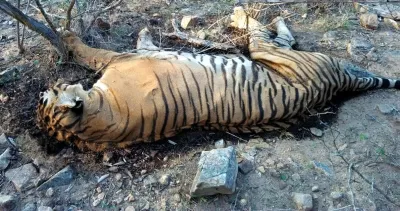Yet Another Tiger Found Dead in Madhya Pradesh, Fourth in a Month

Synopsis
Key Takeaways
- Fourth tiger death in Madhya Pradesh this month.
- Preliminary investigations suggest starvation and dehydration.
- A wire noose was found around the tiger's neck.
- The tiger was likely ensnared for approximately 15 days.
- Possibility of poaching remains unconfirmed.
Bhopal, March 2 (NationPress) The lifeless body of yet another majestic tiger was located, concealed within the foliage of the Balaghat forest region. This unfortunate incident signifies the fourth tiger fatality in merely one month, raising serious concerns regarding the conservation and safeguarding of the big cat population in Madhya Pradesh, often referred to as the ‘Tiger State’ of India.
L Krishnamoorthy, the Additional Principal Chief Forest Conservator (wildlife) of Madhya Pradesh, confirmed this somber find and informed IANS, "The tiger's carcass was discovered in the Kodmi beat of the Mundiwara circle, located within the Katangi range this past Saturday."
While preliminary investigations have ruled out poaching, the situation remains unresolved. "This case is currently under investigation," he added.
Initial assessments from wildlife officials and veterinarians suggest that starvation and dehydration might have contributed to the tiger's demise.
“This was a male tiger. It appears to have suffered due to a sinister wire noose discovered around its neck,” the official reported.
The investigation uncovers a distressing narrative as a snare found around the tiger's neck inflicted severe injuries, ultimately preventing the animal from eating, leading to a prolonged and painful death.
While the presence of the snare indicates a tragic story, insiders suggest that the tiger likely became ensnared in a trap typically employed by poachers to capture warthogs, wild boars, and other creatures.
The tiger may have fought for survival while trying to escape. Experts estimate that the animal was likely trapped for about 15 days.
Unverified reports indicate that a day prior to the tiger’s death, the beat staff had spotted the tiger in the same vicinity, yet its critical condition went unnoticed.
Tragically, when forest personnel conducted a search for the tiger on Saturday morning, they discovered its lifeless body hidden among the underbrush. Upon notification, range officers quickly arrived at the location. Senior officials were alerted, and veterinarians performed an on-site post-mortem examination before disposing of the remains.
The unfortunate wire snare discovered around the tiger's neck is usually employed by hunters at the forest-field perimeter to catch wild boars.
The Forest Department currently theorizes that the snare was aimed at a boar, with the tiger becoming an unintended casualty. Nevertheless, the possibility of poaching cannot be entirely dismissed.
In a related development, another tiger's carcass was found in the Karakati area, part of the Pali range within the Umaria district's Forest Division, just two weeks prior. However, forest officials have ruled out poaching as all body parts of the animal were intact.










